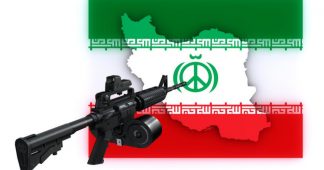By Ed Adamczyk
Dec 23, 2020
An Israeli submarine transited the Suez Canal and is in the Red Sea, poised for possible action against Iran, the Israeli television station KAN 11 reported.
The Dolphin-class submarine, typically armed with long-range ballistic missiles capable of carrying nuclear warheads, crossed the canal with the approval of Egypt, the canal custodian.
It sailed on the surface, indicating eagerness on the part of the Israeli military for its visibility, to the Red Sea.
הצוללת הישראלית בדרך לאיראן – חשיפת כאן חדשות | גורמי מודיעין ערביים: צוללת של חיל הים חצתה את תעלת סואץ באופן גלוי ובאישור מצרי, לכיוון המפרץ הפרסי. הגורמים העריכו שישראל ניסתה להעביר מסר לטהראן. מצה"ל נמסר שהם לא מתייחסים לפרסומים מסוג זה @kaisos1987 #חדשותהערב pic.twitter.com/T67OG9QrMw
— כאן חדשות (@kann_news) December 21, 2020
The action is regarded as one of a series of recent warning signals to Iran of preparation for an upcoming attack.
Israel awaits possible retaliation for the November assassination of Mohsen Fakhdizadeh, a senior Iranian nuclear scientist, and Jan. 3 marks the first anniversary of the assassination of Iranian Gen. Qassem Soleimani, who died in a U. S. drone strike in Iraq.
The guided-missile submarine USS Georgia passed through the Strait of Hormuz, the U.S. Naval Forces Central Command said Monday in a rare disclosure.
The submarine, which can carry up to 154 Tomahawk cruise missiles, was escorted by the guided missile cruisers USS Port Royal and USS Philippine Sea through the strait as it entered the Persian Gulf.
Last week, Gen. Mark Milley, chairman of the U.S. Joint Chiefs of Staff, visited Israel, where Israeli Defense Minister Benny Gantz stressed “the importance of continued pressure on the regime in Iran and the IDF’s [Israel Defense Force] preparedness for all eventualities in the face of Iran’s regional aggression and nuclear armament,” a spokesman for Gantz’s office said.
In addition, U.S. Air Force B-52 bombers headed to the Gulf region in early December, escorted by Saudi aircraft.
“This is all trying to signal Iran a message: not to respond to the killing of Fakhrizadeh,” commented Yoel Guzansky of the Institute for National Security Studies of Tel Aviv University.
Israel has recently undertaken security and intelligence-collecting agreements with nearby Arab countries which are equally concerned about Iran’s actions, normalized relations with the United Arab Emirates and Bahrain, and agreed to separate peace arrangements with Sudan and Morocco.
Published at www.upi.com











